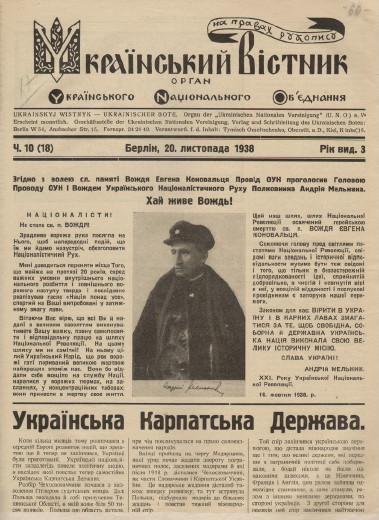Ukrainian National Alliance
Ukrainian National Alliance [Українське національне об’єднання or УНО; Ukrainske natsionalne obiednannia, or UNO]. An émigré organization centered in Berlin. Established in 1933, it was one of two Ukrainian community organizations tolerated by the Nazi regime (the other was the Ukrainian Hromada). It was active in central Germany and then expanded into Austria and the protectorates of Bohemia and Moravia in 1937–45. Its membership expanded markedly after it adopted a Ukrainian nationalist position in 1937. In spite of government restrictions, the UNO had 42,000 members in over 1,268 branches and lesser groups in 1942. Until 1937 it was headed by Fedir Koroliv and I. Drabaty, and in 1937–45 by Tymish Omelchenko. Members of the UNO executive included Yu. Artiushenko, M. Dorozhynsky, Bohdan Kravtsiv, Denys Kvitkovsky, V. Levytsky, Volodymyr Maruniak, Mykhailo Seleshko, P. Verzhbytsky, and Volodymyr Yaniv. The executive had active publicist departments in Berlin and ran a publishing house in Prague. The UNO's official press organ was the weekly Ukraïns’kyi visnyk (Berlin). During the Second World War it also operated a Ukrainian Information Bureau out of Berlin, which informed Germans and other non-Ukrainians about Ukrainian affairs. Apart from its work in organizing lectures and classes, the UNO defended the interests of Ukrainian workers in Germany (forced [see Ostarbeiter] and voluntary), assisted Ukrainian students, and gave aid to Ukrainian prisoners of war from Soviet and Polish units. During the course of the war the UNO published 13 educational brochures and 2 brochures on the rights and duties of Ukrainian workers. Lower-level UNO groups organized courses in Ukrainian studies, German language instruction, folk dancing, driving, and first aid; sponsored art workshops; and ran various libraries and reading rooms. In 1943–5 the Gestapo began persecuting its members. The UNO was finally forced to cease activities outright after the occupation of Berlin by the Soviet Army in 1945.
Arkadii Zhukovsky
[This article originally appeared in the Encyclopedia of Ukraine, vol. 5 (1993).]

